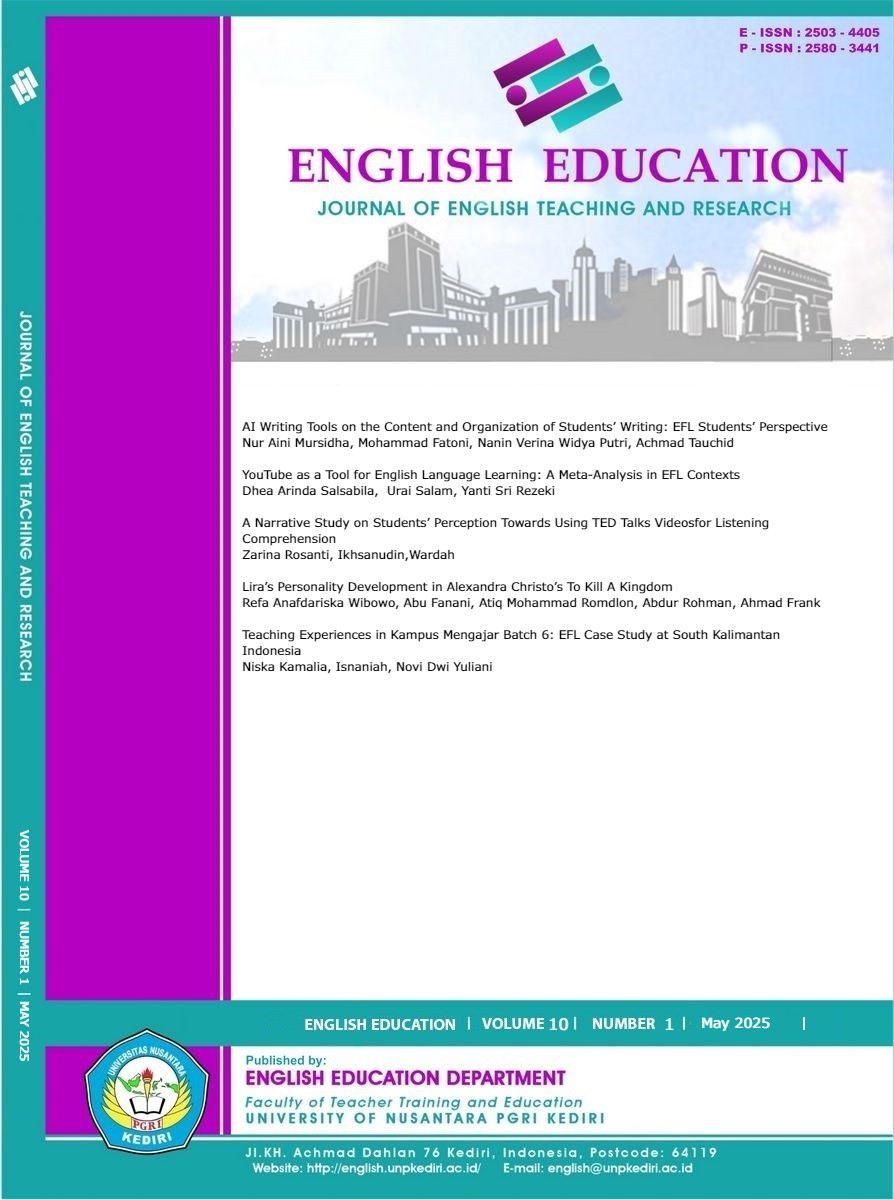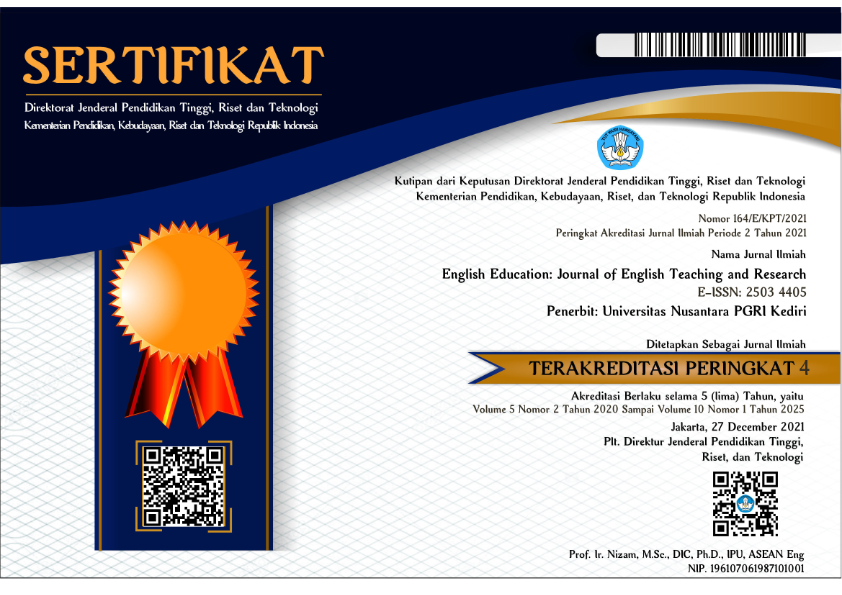Perspectives of Vietnamese Students and Teachers on the Effectiveness of Grammarly in English Writing Development
DOI:
https://doi.org/10.29407/jetar.v10i1.23743Keywords:
Grammarly, L2 writing, learners’ perspectives, teachers’ perspectives, VietnameseAbstract
This study seeks to investigate the efficacy of Grammarly, an AI-powered tool, in enhancing English writing skills from both teachers' and students' viewpoints. To achieve this, the study employed a qualitative case study approach, conducting semi-structured interviews with five teachers and ten students at a private university in Ho Chi Minh City, Vietnam. The data were analyzed through thematic analysis to uncover patterns and insights. The findings indicate a consensus among students and teachers regarding Grammarly's value in augmenting writing skills, particularly in its capacity for error detection and the provision of immediate feedback. However, notable differences in opinion emerged between the two groups. While students tend to unquestioningly embrace the feedback from Grammarly, teachers approach the tool’s suggestions with more critical evaluation. The distinction highlights differing attitudes towards the role of Grammarly in writing development and points to significant pedagogical implications for its integration into English language instruction.
Downloads
References
Ardhy, A. A. S., Waris, A. M., & Kryati, L. (2023). Enhancing Writing Skills: Students’ Perspectives on the Grammarly Application’s Role in Academic Writing. ETERNAL (English, Teaching, Learning, and Research Journal), 9(2), 221–230. https://doi.org/10.24252/Eternal.V92.2023.A4
Armanda, M. L., Nugraheni, A. F., Wulansari, A., & Imron, A. (2022). "Grammarly" as English writing assistant from EFL students’ perspective. English Education: Journal of English Teaching and Research, 7(2), 128-137. https://doi.org/10.29407/jetar.v7i2.17988
Astuti, D., & Sumarni, S. (2023). Grammarly in students’ self-directed learning for writing skills: Advantages and disadvantages. Jurnal Pemikiran Alternatif Kependidikan, 28(1), 36–50. https://doi.org/10.24090/insania.v28i1a.8899
Bailey, D., & Lee, A. R. (2020). An exploratory study of Grammarly in the language learning context: An analysis of test-based, textbook-based, and Facebook corpora. TESOL International Journal, 15(2), 4–17. https://files.eric.ed.gov/fulltext/EJ1268470.pdf
Bardianing, W., Wirawati, B., Surjowati, R., Shalsadita, R. T., Soekandar, A. A., & Rizaldi, S. A. (2023). Art Students’ Error Analysis in Using Past Tense in Narrative Essay. English Education: Journal of English Teaching and Research, 8(2), 199-210. https://doi.org/10.29407/jetar.v8i2.21077
Barrot, J. S. (2023). Using automated written corrective feedback in the writing classrooms: Effects on L2 writing accuracy. Computer Assisted Language Learning, 36(4), 584–607. https://doi.org/10.1080/09588221.2021.1936071
Daroina, A., Febriani, W. E., Aulianisa, A., & Fadlia, W. A. (2022, June). Systematic literature review: Grammarly as a medium in analyzing grammar for university students. In Conference on English Language Teaching (Vol. 2, pp. 276-289).
Dewi, U. (2022). Grammarly as automated writing evaluation: Its effectiveness from EFL students’ perceptions. Lingua Cultura, 16(2), 155-161. https://journal.binus.ac.id/index.php/Lingua/article/view/8315
Fadhilah, U., Julia, H., & Saribu, D. (2019). Effectiveness of Grammarly application for writing English Abstract. International Journal of Science and Research, 8 (12), 163-166. https://www.ijsr.net/archive/v8i12/ART20202994.pdf
Faisal, F., & Carabella, P., A. (2023). Utilizing Grammarly in an academic writing process: Higher-education students' perceived views. Journal of English Language Teaching and Linguistics, 8(1), 2023, 23-42. http://dx.doi.org/10.21462/jeltl.v8.i1.1006
Farida, M. (2022). Beliefs about feedback provision in EFL writing and the actual practices by an experienced Indonesian teacher. English Education: Journal of English Teaching and Research, 7(2), 190-204.https://doi.org/10.29407/jetar.v7i2.18519
Fitriana, K., & Nurazni, L. (2022) Exploring English department students’ perceptions on using Grammarly to check the grammar in their writing. Journal of English Teaching, 8( 1), 15-25. https://doi.org/10.33541/jet.v8i1.3044
Karyuatry, L. (2018). Grammarly as a tool to improve students’ writing quality: Free online-proofreader across the boundaries. Jurnal Sains Sosial dan Humaniora, 2(1), 83-89. https://doi.org/10.30595/jssh.v2i1.2297
Mackey, A., & Gass, S. M. (2021). Second Language Research: Methodology and Design. Routledge.
Neuendorf, K. A. (2002). The content analysis guidebook. Sage Publications.
Nguyen, N. T. (2024).The Use of Grammarly Application in Writing a Graduation Project among Senior Students Majoring in English Language at Nam Can Tho University. International Journal of Science and Management Studies, 7(4), 23-30. https://doi.org/10.51386/25815946/ijsms-v7i4p103
Nguyen, T. T. H., & Hoang, T. T. H. (2023). Exploring the use of adaptive learning technology in higher education writing classes: students’ perspectives. VNU University of Languages and International Studies, 39 (4), 16-38. https://doi.org/10.63023/2525-2445/jfs.ulis.5082
Nguyen, H. D. T. C., Le, V. T., & Bui, T. T. Q. (2024). Digital Feedback on EFL Students' Writing: Teachers' Beliefs and Practice. In T.Q. Tran, & M. T. Duong (Eds.), Addressing Issues of Learner Diversity in English Language Education (pp.39-60).IGI Global.
Perdana, I., Manullang, S. O., & Masri, F. A. (2021). Effectiveness of online Grammarly application in improving academic writing: Review of experts' experience. International Journal of Social Sciences, 4(1), 122-130. https://doi.org/10.31295/ijss.v4n1.1444
Puri, G., & Setiamunadi, A. A. (2023). The use of Grammarly by tertiary English language learners in their online writing classes. English Education: Journal of English Teaching and Research, 8(2), 163-179.https://doi.org/10.29407/jetar.v8i2.20981
Qassemzadeh, A., & Soleimani, H. (2016). The impact of feedback provision by Grammarly software and teachers on learning passive structures by Iranian EFL learners. Theory and Practice in Language Studies, 6(9), 1884-1894. https://doi.org/10.17507/tpls.0609.23
Tambunan, A. R. S., Andayani, W., Sari, W. S., & Lubis, F. K. (2022). Investigating EFL 'students' linguistic problems using Grammarly as automated writing evaluation feedback. Indonesian Journal of Applied Linguistics, 12(1), 16–27. https://doi.org/10.17509/ijal.v12i1.46428
Tarsan, V., Kandang, A., & Helmon, A. (2021). Students’ Perception Towards the Application of Grammarly: The Automatic Grammar Checker in Writing Narrative Text in the Third Semester at Stkip Ypup Makassar. Jurnal Inovasi Pendidikan Dasar, 5(2), 123–133. https://doi.org/10.36928/jipd.v5i2.858
Van Rensburg, H. & La. T. T. (2021). Impacts of using technology-enhanced language learning in second language academic writing at a Vietnamese university. In Enomoto, K. W. & Richard, N. C. (Eds.) Teaching and learning innovations in higher education (pp. 147-172). Libri Publishing. https://research.usq.edu.au/download/4272a677f9b0ab2604c32f0e7779699df5b89f4b01b11737b18d39bd81c05239/1590250/Chapter%207.pdf
Zinkevich, N. A., & Ledeneva, T. V. (2021). Using Grammarly to enhance students’ academic writing skills. Professional Discourse & Communication, 3(4), 51-63. https://doi.org/10.24833/2687-0126
Downloads
Published
Issue
Section
License
Copyright (c) 2025 Vy Luu Thi Mai, Quỳnh Tran Vo Nhu , Hiếu Nguyen Minh, Nhung Tran Thi Hong

This work is licensed under a Creative Commons Attribution-ShareAlike 4.0 International License.
Authors who publish with this journal agree to the following terms:
- Copyright on any article is retained by the author(s).
- The author grants the journal, the right of first publication with the work simultaneously licensed under a Creative Commons Attribution License that allows others to share the work with an acknowledgment of the work’s authorship and initial publication in this journal.
- Authors are able to enter into separate, additional contractual arrangements for the non-exclusive distribution of the journal’s published version of the work (e.g., post it to an institutional repository or publish it in a book), with an acknowledgment of its initial publication in this journal.
- Authors are permitted and encouraged to post their work online (e.g., in institutional repositories or on their website) prior to and during the submission process, as it can lead to productive exchanges, as well as earlier and greater citation of published work.
- The article and any associated published material is distributed under the Creative Commons Attribution-ShareAlike 4.0 International License








 Article template
Article template



